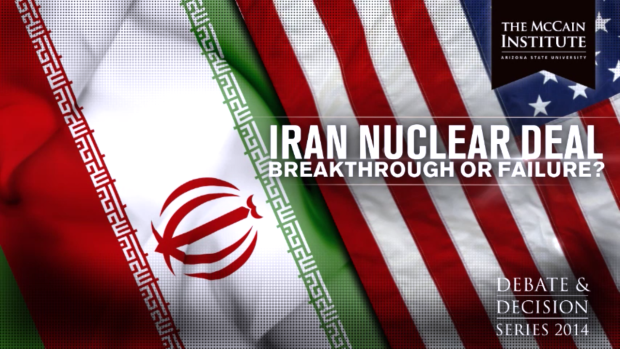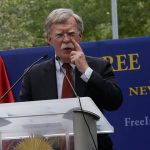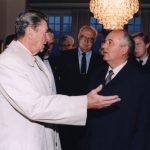by Derek Davison
Prominent neoconservative writers Bret Stephens and Reuel Marc Gerecht called for a much tougher approach to talks with Iran over its nuclear program in a debate hosted here by the McCain Institute on March 11. The discussion comes one week before talks aimed at a final deal between Iran and world powers resume in Vienna.
Stephens, the deputy editorial page editor of the Wall Street Journal, and Gerecht, a senior fellow at the Foundation for Defense of Democracies, were up against the Brookings Institute’s Robert Einhorn who served as a top non-proliferation adviser at the State Department in Obama’s first term, and the Carnegie Endowment’s Karim Sadjadpour, both of whom argued that now is the right time to give diplomacy a chance to succeed.
The neoconservative writers hammered the Joint Plan of Action (JPA) negotiated between Iran and the P5+1 (the US, Britain, France, China, and Russia plus Germany) in Geneva on November 24, 2014 as a surrender of sanctions for few, if any, Iranian concessions. Gerecht, who wrote in 2002 that an invasion of Iraq and the installation of a democratic government there would “probably” cause regime change in Iran, characterized the difference between those who support the JPA and those who oppose it as all related to a single question: “are you prepared to pre-emptively strike Iran to prevent it from developing a nuclear weapon?” Supporters of the JPA, he contended, are not, implying that they’re not tough enough to extract a favorable deal from the Iranians either. Stephens, a supporter of the Iraq War who still insists that the war was based on sound intelligence, took an even harder line against the negotiating process, contending that “the whole strategy of Iran since negotiations began in 2002 has been to delay and delay and delay” in order to continue developing its nuclear program without risking a military response.
On the other side, Einhorn commended the JPA, calling it “a very promising first step that halts movement in Iran’s nuclear program for the first time in twelve years” that also greatly improved access for international monitors, in exchange for relatively light sanctions relief. Sadjadpour added that instead of criticizing the JPA for not being “the ideal deal,” opponents “have to look at the reasonable alternatives,” which are not favorable. A harder American line on issues like uranium enrichment, according to Sadjadpour, would also risk splintering the international consensus that has supported the sanctions regime thus far and might embolden Iranian hardliners to stop talking and fully pursue a nuclear weapons program.
The question of reasonable alternatives to the JPA — whether there were any and whether those would have been preferable to the deal that was reached — permeated the discussion. Both Einhorn and Sadjadpour stressed the degree to which America must be seen as allowing room for diplomacy to work in order to build international support for tougher actions (whether economic or military) down the road, if needed. Stephens and Gerecht, on the other hand, supported stronger sanctions even at the risk of Russia and China abandoning the P5+1 altogether. When Einhorn pointed out that China is the largest importer of Iranian crude and would undoubtedly increase its imports if they were to pull out of the sanctions coalition, Gerecht countered with the argument that neither Russia nor China’s departure from the coalition would have much impact on the most painful banking sanctions. This assertion, an interesting one given that the Bank of Moscow just agreed to pay a $10 million fine to the Treasury Department for violating sanctions against the Iranian banking industry, was left unchallenged.
The moderate Einhorn did, however, support a general “toughening” of the US negotiating position, proposing that Congress could pass a “prior authorization to use force” resolution to empower President Barack Obama to strike Iran if it violates its obligations. No one mentioned what happened the last time Congress gave a president prior authorization to use military force over a Middle Eastern nation’s supposed weapons of mass destruction program.
Another hotly contested point had to do with the efficacy of international monitoring. Einhorn praised the JPA for its verification provisions and for laying the groundwork for even tougher monitoring in a permanent agreement. He pointed to successes in identifying the facilities at Natanz, Arak, and Fordow as evidence that monitoring and intelligence gathering has worked, while Stephens pointed to America’s failure to predict India’s 1998 nuclear tests as evidence that verification can easily fail. Gerecht argued that Iran will resist more stringent monitoring in a permanent agreement, and warned that the US intelligence community likely has no sources in high positions either in the Iranian government or its nuclear program, and therefore lacks the ability to check what international monitors find.
The debate over monitoring highlighted what seems to be a fundamental flaw in the neoconservative position: by their logic there seems to be no circumstance under which negotiations can be allowed to work. After all, according to their argument the Iranians cannot be trusted, verification does not work, and toughening sanctions is always better than easing sanctions. If there is no way to trust that verification can work, and no way to trust the Iranians themselves, then how can there be a diplomatic solution to this situation? Gerecht’s question about pre-emptive military action could easily be reframed for opponents of the JPA: “are you prepared to ease sanctions on Iran, ever, in exchange for any Iranian concessions?” Are sanctions, and the implicit threat of military action they contain a means to the end of preventing Iran from achieving a nuclear weapon (or rapid breakout capacity), or are they the end in themselves?
The two sides did find common ground in supporting a policy of regime change in Iran, but had drastically different ideas as to implementation. Sadjadpour suggested that if the West pursues policies that cultivate goodwill among Iranians, and especially the Iranian youth, Iranian leader Ayatollah Ali Khamenei may have no choice but to acquiesce to internal pressure to improve relations. On the other hand Gerecht and Stephens argued that a military strike that drastically set back Iran’s nuclear program would severely damage the regime’s credibility at home, a questionable assumption that has been challenged by moderate Iranian leaders. Einhorn cautioned that there is no way to know how far back a strike could set Iran’s nuclear program, but that it would certainly end any chance of a negotiated nuclear settlement and put Iran inexorably on the path toward developing a nuclear weapon.






They just wont quit. For all the warmongers, I say put them on the bombs/missiles literally, as in Dr. Stranglove, so they get the first view. Of course, they would all hide before that took place. How callus these denizens of the neocon ivory towers are, willing to destroy a country because of their support of another foreign government, which makes them traitors to the very country they live and prosper in. Let’s face reality here, military strikes will result in destroying everything that’s above ground that has anything to do with Iran’s economy. Ah, that would make certain states in the M.E. happy, as it would eliminate competition in the oil/gas market as well as drive the prices to everyone else beyond belief. This do as we say or we’ll bomb you back to the stone age, well, look at the countries that have received such largess.
Marc ReuelGerecht and Brett Stephens are of course diehard neocons, promoting endless American aggression in the Middle East, to “protect” Israel.
Anybody who supported war on Iraq on made up “intel” and shit-loads of lies should be standing in soup lines and not taken seriously even there. As Norman said – put them to the first kamikaze rockets flying to Iran and they would hide before their martyrdom. At least humanity would get a peace from these fleas.